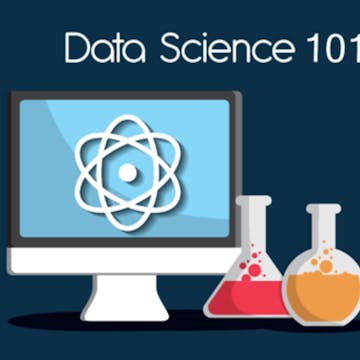
Good to know
Save this course
Reviews summary
Ciencia de datos: una introducción
Activities
Review basic statistics
Show steps
Ensure you have a solid foundation in statistics, which is essential for data science
Browse courses on
Statistics
Show steps
-
Review the concepts of mean, median, and mode
-
Practice calculating standard deviation and variance
-
Understand the difference between correlation and causation
Read 'Data Science for Business'
Show steps
Introduce yourself to data science concepts at a beginner level
View
Data Science for Business: What You Need to...
on Amazon
Show steps
-
Read the first five chapters
-
Take notes on the key concepts
-
Complete the exercises at the end of each chapter
Attend a data science meetup
Show steps
Connect with other data science professionals and learn about industry trends
Browse courses on
Networking
Show steps
-
Find a meetup in your area
-
Attend the meetup and introduce yourself
-
Follow up with people you meet
Four other activities
Expand to see all activities and additional details
Show all seven activities
Practice SQL queries
Show steps
Get hands-on experience with SQL, a common tool in data science
Browse courses on
SQL
Show steps
-
Create a database
-
Populate it with data
-
Write queries to retrieve and manipulate data
Create a data visualization dashboard
Show steps
Develop your data storytelling skills by creating a visual representation of data
Browse courses on
Data Visualization
Show steps
-
Choose a dataset
-
Select the appropriate charts and graphs
-
Create the dashboard and share it with others
Develop a machine learning model
Show steps
Gain practical experience with machine learning techniques
Browse courses on
Machine Learning
Show steps
-
Choose a dataset
-
Preprocess the data
-
Select and train a machine learning algorithm
-
Evaluate the model
Participate in a data science competition
Show steps
Test your skills and learn from others in a competitive environment
Browse courses on
Kaggle
Show steps
-
Find a competition that aligns with your interests
-
Form a team or work individually
-
Submit your solution
Review basic statistics
Show steps
Ensure you have a solid foundation in statistics, which is essential for data science
Browse courses on
Statistics
Show steps
- Review the concepts of mean, median, and mode
- Practice calculating standard deviation and variance
- Understand the difference between correlation and causation
Read 'Data Science for Business'
Show steps
Introduce yourself to data science concepts at a beginner level
View
Data Science for Business: What You Need to...
on Amazon
Show steps
- Read the first five chapters
- Take notes on the key concepts
- Complete the exercises at the end of each chapter
Attend a data science meetup
Show steps
Connect with other data science professionals and learn about industry trends
Browse courses on
Networking
Show steps
- Find a meetup in your area
- Attend the meetup and introduce yourself
- Follow up with people you meet
Practice SQL queries
Show steps
Get hands-on experience with SQL, a common tool in data science
Browse courses on
SQL
Show steps
- Create a database
- Populate it with data
- Write queries to retrieve and manipulate data
Create a data visualization dashboard
Show steps
Develop your data storytelling skills by creating a visual representation of data
Browse courses on
Data Visualization
Show steps
- Choose a dataset
- Select the appropriate charts and graphs
- Create the dashboard and share it with others
Develop a machine learning model
Show steps
Gain practical experience with machine learning techniques
Browse courses on
Machine Learning
Show steps
- Choose a dataset
- Preprocess the data
- Select and train a machine learning algorithm
- Evaluate the model
Participate in a data science competition
Show steps
Test your skills and learn from others in a competitive environment
Browse courses on
Kaggle
Show steps
- Find a competition that aligns with your interests
- Form a team or work individually
- Submit your solution
Career center
Data Scientist
Data Analyst
Machine Learning Engineer
Data Engineer
Business Analyst
Statistician
Operations Research Analyst
Financial Analyst
Market Research Analyst
Actuary
Biostatistician
Data Architect
Database Administrator
Software Engineer
Reading list
Share
Similar courses
OpenCourser helps millions of learners each year. People visit us to learn workspace skills, ace their exams, and nurture their curiosity.
Our extensive catalog contains over 50,000 courses and twice as many books. Browse by search, by topic, or even by career interests. We'll match you to the right resources quickly.
Find this site helpful? Tell a friend about us.
We're supported by our community of learners. When you purchase or subscribe to courses and programs or purchase books, we may earn a commission from our partners.
Your purchases help us maintain our catalog and keep our servers humming without ads.
Thank you for supporting OpenCourser.



